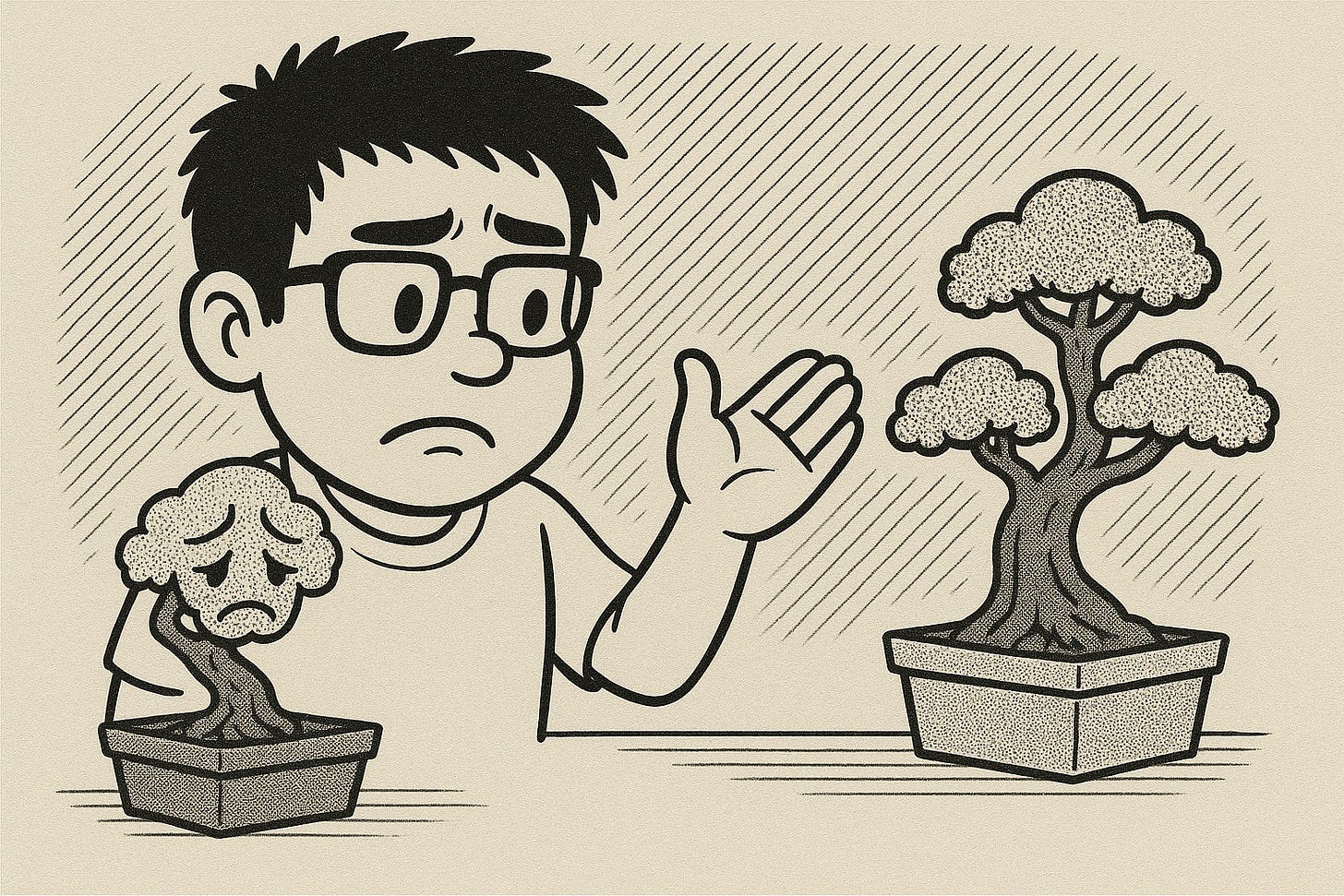Not All Slips Are Your Fault: Why Discipline Is About Alignment, Not Willpower
When self-discipline fails, it might not be your fault. Here’s why environment matters.
We tend to think discipline is a matter of force.
If we want to stay on track, we just need to try harder, stick to the plan, push through.
But lately, I’ve been wondering: what if that’s not the whole story?
What if, sometimes, we fall off the path not because we’re lazy or uncommitted, but because we’ve been quietly placed in the wrong spot?
I wasn’t reading a book or listening to a podcast when I had this realization.
I was tending to my bonsais.
The slip wasn’t in the effort; it was in the environment
I have four bonsais. I water them, prune them, check their soil. I’ve learned enough to feel confident in how I care for them. But a few weeks ago, I noticed something strange: two of them were thriving, and two were clearly struggling.
One pair stood upright, vibrant, green.
The other pair looked dry, slouched, and fragile, barely holding onto their needles.
Same species. Same watering schedule. Same pots. Same attention.
So why were the results so different?
That’s when I took a closer look at their placement.
The two healthy ones were sitting farther away from any direct heat, in a spot with calm, steady light.
The other two?
I had placed them by the windowsill, right next to a heat fan.
I thought I was giving them a great spot with more light.
But the dry air, subtle and constant, was slowly pulling the life out of them.
It wasn’t neglect.
It wasn’t laziness.
But it was a misjudgment.
A mistake in placement, not in care.
When we slip, it's often not because we're broken. We’re just misaligned
That moment stayed with me. Because I’ve seen the same thing happen in myself.
How many times have I fallen out of rhythm with a habit or a goal, not because I stopped caring, but because something around me shifted, and I didn’t notice?
We talk about discipline like it’s something internal. A character trait. A virtue.
But external factors matter too. A lot more than we admit.
Studies back this up.
One experiment found that people in tidy, quiet environments made significantly more disciplined choices than those in messy or overstimulating ones1.
Even small cues — noise, clutter, poor lighting — can drain our mental resources without us realizing it.
“You do not rise to the level of your goals.
You fall to the level of your systems.”
— James Clear, Atomic Habits
We tend to blame ourselves when things start slipping.
But what if it’s not your willpower?
What if you’re just sitting too close to the heat?
Discipline isn’t rigidity; it’s realignment
There are two kinds of setbacks I’ve come to recognize:
The ones we choose — to pause, to rest, to recalibrate.
And the ones we fall into — when invisible stressors quietly pull us off course.
The second kind is harder to name.
It feels like failure, even though it’s often just misalignment.
A misplaced plant.
A misplaced habit.
A misplaced you.
What changed things for my bonsais wasn’t more effort. It wasn’t a new tool or technique.
It was a simple adjustment. I moved them.
They didn’t bounce back overnight. But they started recovering.
And that felt familiar, too.
Real discipline is knowing when to adjust
Discipline isn’t just about pushing harder.
It’s about noticing what’s not working, before it breaks you.
It’s about making thoughtful, honest adjustments.
And it’s about returning — not restarting — when things drift.
“Comeback speed is how quickly you realign when life knocks you off center.”
It’s not about guilt.
It’s not about streaks.
It’s not even about how hard you push.
It’s about how gently, honestly, and quickly you return to yourself and your path.
But even that isn’t the whole story.
Because the deeper shift is in reducing how often you get knocked off in the first place.
And that starts with placement.
With awareness.
With reflection.
That’s what discipline looks like:
Not force. But attunement.
Not control. But placement.
Not perfection. But realignment.
Next time you drift, ask:
What around me shifted?
What’s pulling me off course?
What would make this path feel smoother again?
Because sometimes, the most disciplined thing you can do…is to move yourself.
Have a wonderful week!
Enjoying this? Support the mission.
I write Self-Disciplined to help more people build real, lasting discipline — without burnout. If my work has helped you, consider supporting it with a coffee or becoming a member.
Vohs, K. D., Redden, J. P., & Rahinel, R. (2013). Physical order produces healthy choices, generosity, and conventionality, whereas disorder produces creativity. Psychological Science, 24(9), 1860–1867. https://doi.org/10.1177/0956797613480186







I'm curious how you'd apply this to something like losing weight, which I've often heard is largely about willpower.
Would you say that it points to your values not being aligned to your stated goal to lose weight? Like, you're saying you want to lose weight but deep down you actually don't?
Love this! Half the battle is setting up the right systems to make discipline easy. Reducing friction and barriers.
Then, aligning those systems with our top values and priorities.